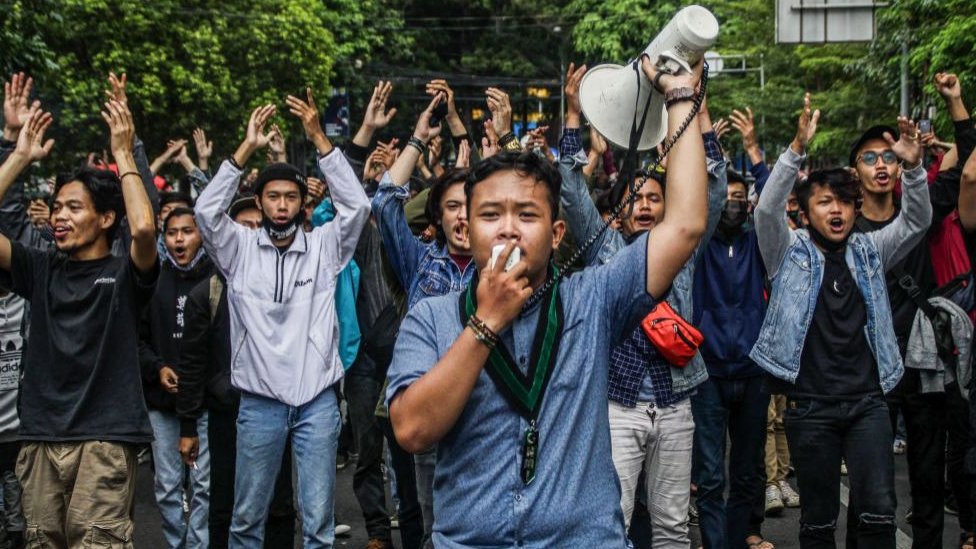Indonesia: Thousands protest against ‘omnibus law’ on jobs
Tens of thousands of Indonesians have protested for a third day against a controversial law that critics say will harm workers and the environment.
Rallies took place around the country. Hundreds were arrested in Jakarta. Hundreds more have been held in strikes and protests in other cities this week.

The so-called “omnibus” jobs creation bill became law on Monday.
The government says the changes are needed to help its economy which has been hit hard by the Covid-19 pandemic.
Demonstrations have gathered steam in the capital Jakarta and other cities such as Bandung on Wednesday and Thursday, after relatively peaceful protests earlier in the week.
Indonesian police detained at least 400 protesters, including some who were allegedly armed with molotov cocktails and sharp weapons.
The bill, which is over 1,000 pages long and amends 79 existing laws, was passed with the support of seven out of nine parties.
Why enact the law?
The bill is aimed at relaxing Indonesia’s complex web of business, labour and environmental laws in an attempt to attract investment and stimulate the economy.
In an interview in January, President Joko Widodo told the BBC that the law is about removing red tape and opening the economy to more foreign investment.
“We want to simplify the licensing and bureaucracy [process], we want speed, so a harmonization of law is needed to create speedy services, speedy policy making, so that Indonesia would be faster to respond to every world change,” he said.
Indonesia’s economy, which is the largest in South East Asia, shrank by 5.3% in the second quarter of this year.
What does the law do?
In addition to removing red tape, the bill makes significant changes to Indonesia’s labour regulations.
It abolishes the sectoral minimum wage, in favour of minimums set by regional governors.
It will reduce severance pay to a maximum of 19 months salary, depending on how long the employee has had the job. Previously the maximum was 32 months pay.
However, a new government fund will provide an additional six months pay to the newly unemployed.
Allowable overtime will be increased to a maximum of four hours in one day and 18 hours a week. Businesses will only be required to give workers one day off a week instead of two.
Restrictions on outsourcing have also been reduced, as have restrictions on the jobs in which expatriates can work.
The law also relaxes environmental standards, only forcing businesses to file an environmental impact analysis if their projects are considered high risk.
The so-called “omnibus law” is expected to create nearly three million jobs for young people who start looking for work and six million people who are unemployed because of the Covid-19 pandemic.
While Indonesia’s ranking in the World Bank’s Ease of Doing Business index has significantly improved in the past five years, it remained stagnant at 73rd in 2019.
It lags behind Vietnam and it is still far away from meeting the government’s target for Indonesia to be ranked 40th.
Mr Widodo has blamed it on complicated and lengthy business permit issuance in Indonesia, which he said could take up to 13 days while in China it only took around nine days.
Keen on luring companies that want to move manufacturing out of China, the government and lawmakers appeared to speed up the law deliberation process to tackle those investment problems.
The Indonesian Chamber of Commerce and Industry has welcomed the law.
On Wednesday, top economic minister Airlangga Hartarto sought to calm protesters and said many of their concerns were based on misinformation.
“I can assure you wages will not be cut,” he told a news conference online.
Who opposes the bill?
A coalition of 15 activist groups, including trade unions, condemned the bill on Sunday and called on workers to join a planned national strike.
The protesters have demanded the government revoke the bill and international unions and human rights groups have condemned it.

The International Trade Union Confederation (ITUC) said the bill would cut wages, remove sick leave provisions and other protections, and undermine job security.
Read Also: Flawless 102 Cart DiAmond A Bargain At 16M
“It is staggering that while Indonesia is, like other countries, facing the devastation of the Covid-19 pandemic the government would seek to further destabilize people’s lives and ruin their livelihoods so that foreign companies can extract wealth from the country,” said ITUC’s General Secretary Sharan Burrow, in a statement.
In addition to unions, Indonesia’s largest Islamic organization, Nahdlatul Ulama (NU) has also voiced opposition. NU’s leader KH Said Aqil Siroj said it would benefit only capitalists, investors and conglomerates and would “trample” on ordinary people.
Separately, 35 investment firms who manage a total of $4.1tn in assets wrote to the Indonesian government raising environmental concerns over the bill.
In a letter, the firms said the bill could have serious repercussions that could “impact the attractiveness of Indonesian markets”. Instead of rolling back environmental regulations, they urged the Indonesian government to do more to protect the country’s forest and peatlands and “adopt a ‘green’ recovery plan to address the economic devastation caused by the pandemic”.
Environmentalists say the wide ranging bill eliminates environmental protections for many new projects and weakens laws aimed at stopping companies from using fire to clear forests to make way for plantations.
Phelim Kine, from the campaign group Mighty Earth, said the Indonesian government had made a “tragic miscalculation” and warned that the bill would “effectively legitimize uncontrolled deforestation”.



